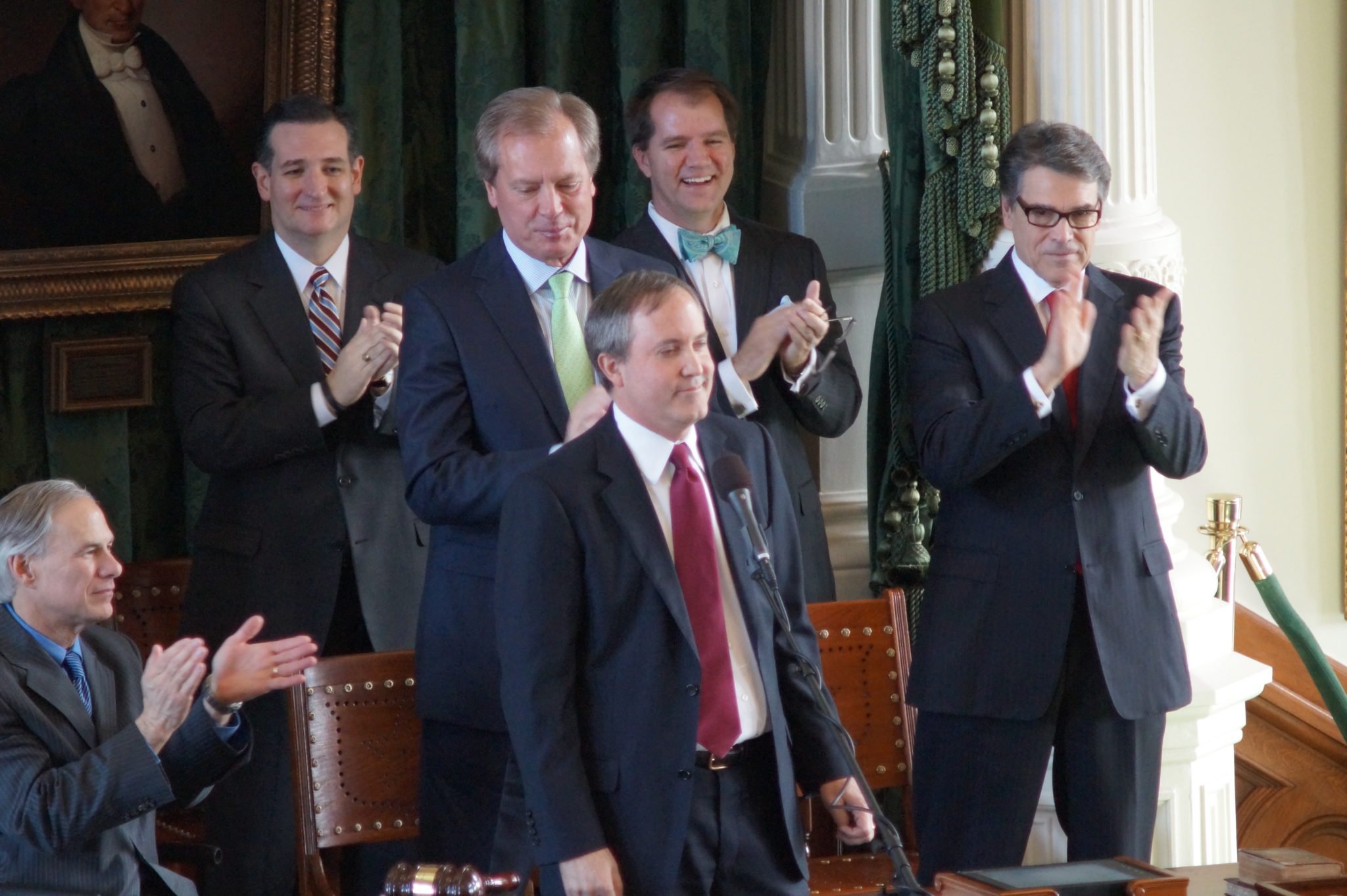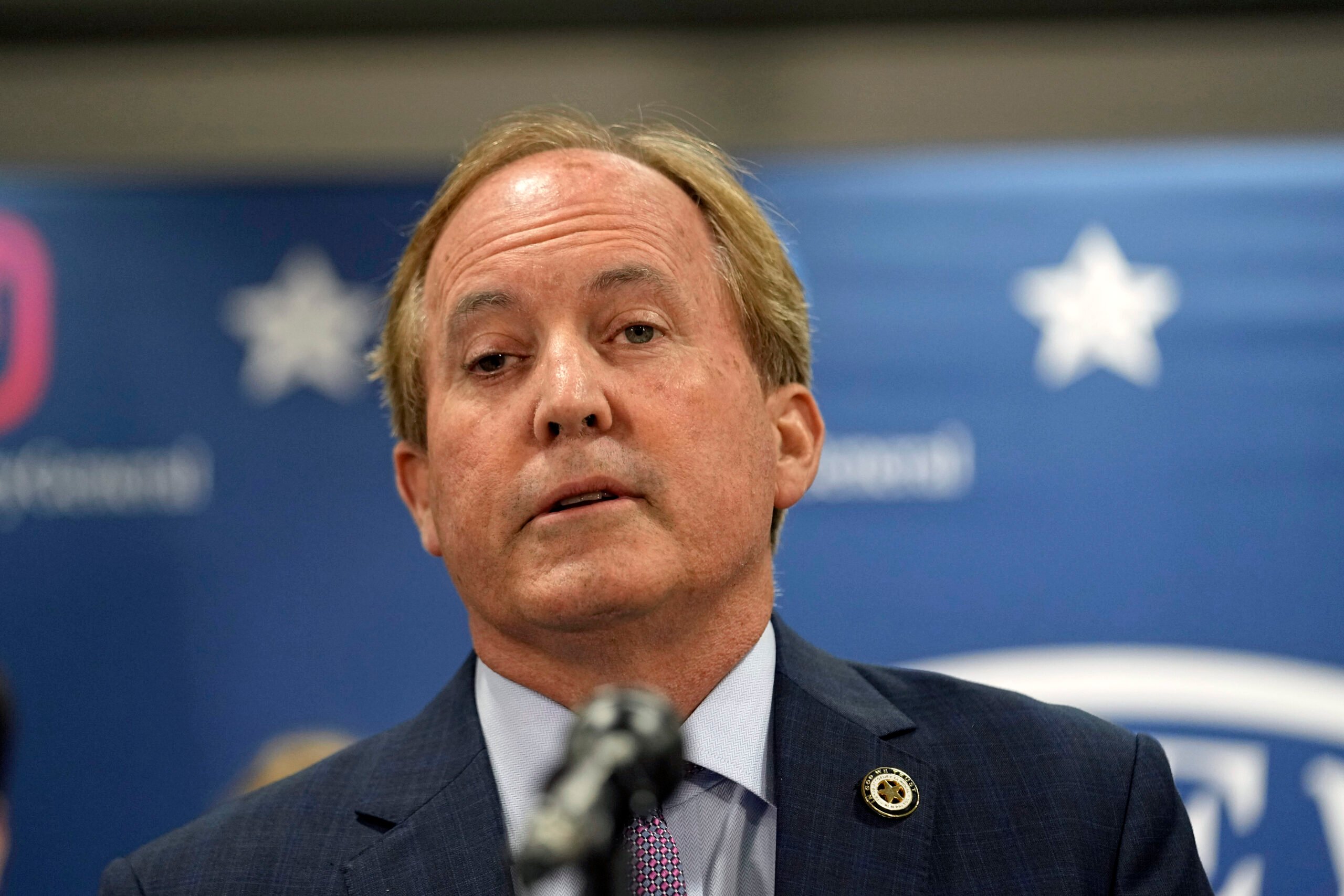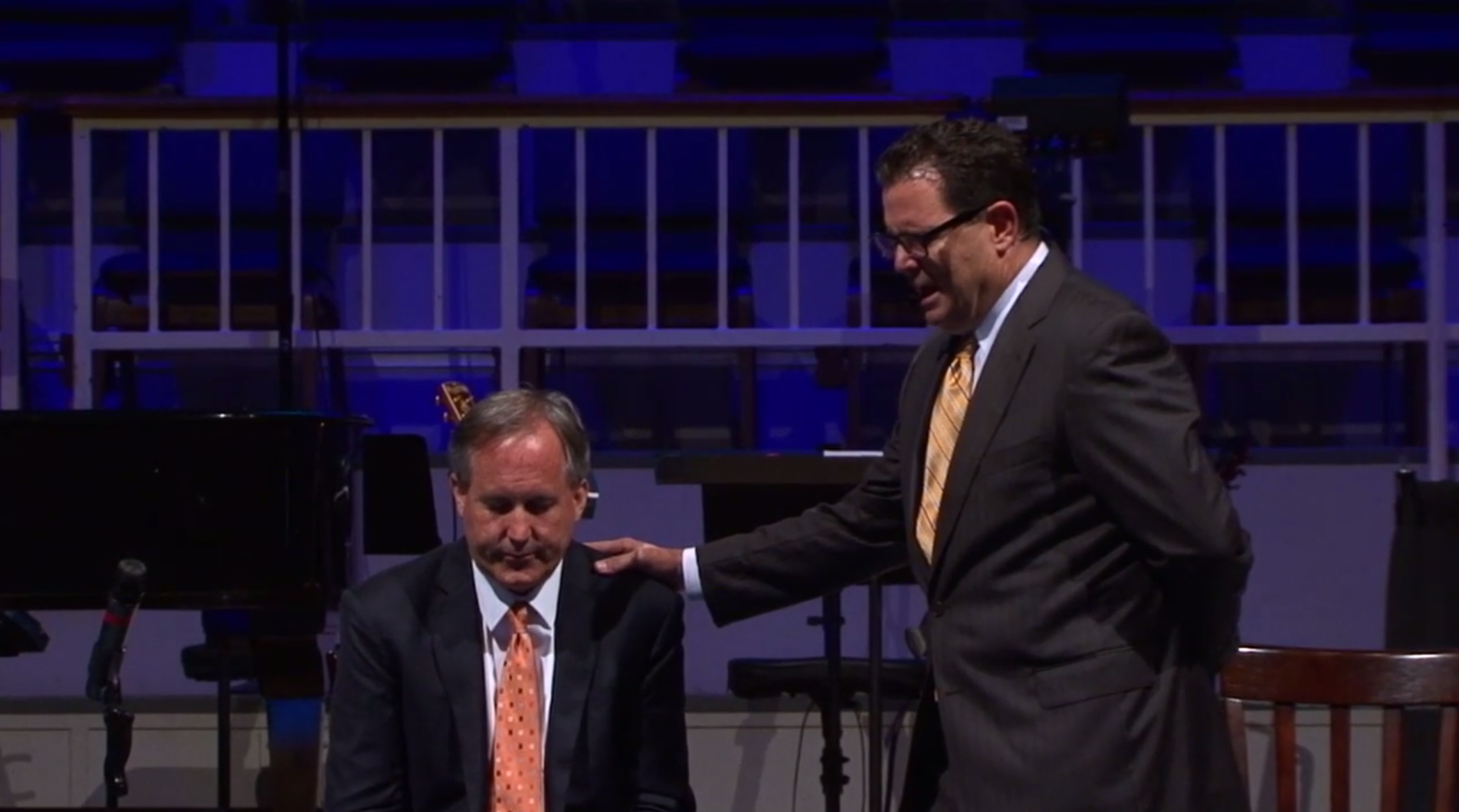
Committee Hears Bill to Allow Ken Paxton to Toss Local Ballot Initiatives

Above: Ken Paxton is applauded by GOP bigwigs at his inauguration in January.
A bill that would give Attorney General Ken Paxton’s office sweeping power to allow or disallow local initiatives and referenda had its first hearing in the House Committee on State Affairs today. The bill is among several in the Legislature squashing local control—and while it got a cautious reception from the committee, it’s supported by some of the state’s most influential business interests.
In recent years, referenda and ballot initiatives have grown in importance as ways for Texans to enact change and hold local governments accountable. The most notable recent example is a ban on hydraulic fracturing in Denton, which passed a fairly conservative electorate by a wide margin. The Denton ban was the subject of much of today’s debate.
House Bill 540, sponsored by Phil King (R-Weatherford), would require any referendum or ballot initiative in one of Texas’ home-rule charter cities to be reviewed by the attorney general’s office. The attorney general would rule on whether the proposed ballot initiative or referendum would violate “the Texas or federal constitution, a state statute, or a rule adopted as authorized by state statute,” or if it would constitute a “government taking of private property.”
That may sound clear-cut, but it’s not. The normal method for deciding whether a law is constitutional involves months or years of careful scrutiny by the courts. Instead, King would give that power to bureaucrats in the AG’s office. If an initiative is detrimental to a powerful and GOP-allied interest group, would the AG’s office really let it slide?
In laying out the bill, King told the committee that Texas was a republic, run by the Legislature, and not a democracy, run by the people. “Democracy is two wolves and a lamb voting on what to have for lunch,” he said, misattributing the quote—which might have originated with a 1990 Los Angeles Times op-ed—to Benjamin Franklin. In places like Denton, powerful and monied outside environmental groups had agitated for change, he said, and the rule of law had to be imposed—by Ken Paxton.
He ran through the list of possible ballot initiatives that could come to Texas cities: bans on genetically modified foods, marijuana legalization, property restrictions—and, most frightening of all—increases to the minimum wage and new labor laws.
But it was fracking bans that motivated him to bring the bill. There are “almost 14,000 gas wells” in municipal areas, King said, and if what happened in Denton set off a wave of similar ordinances (it hasn’t, yet) all those wells, and the money they generate for their owners, would be under threat.
The fight over “local control” issues at the Legislature—it was once a concept that Republicans loved, but they seem to be turning against it, from Gov. Abbott on down—is in part due to the fragmented nature of Texas state government these days. State government is dominated by the right, but the state’s cities and urban counties are significantly to the left of state government.
Business interests would prefer a regulatory climate designed and maintained by the Legislature, since it’s a lot friendlier to them. City ordinances are a threat to that regulatory framework. Cities have taken action in a number of areas where they feel the state has failed to act—like ongoing attempts to regulate payday lenders—but their legal right to do so is such cases in constantly under scrutiny.
Today’s hearing heard testimony in favor of the bill from the Texas Oil & Gas Association (TxOGA), represented by former Agriculture Commissioner Todd Staples, as well as representatives from the powerful Texas Association of Business, the Texas Association of Builders and the Texas Restaurant Association. TxOGA fears restrictions on drilling. The restaurant and construction guys fear minimum wage hikes, among other items, and the Texas Association of Business fears all of the above, plus other local regulations such as the plastic bag bans that have passed in big Texas cities.
“You can’t have economic development if state law doesn’t mean anything,” said a Texas Association of Business representative.
A representative from the Texas Municipal League, which represents local governments, spoke against the bill but he was cautious in his condemnation—referenda and initiatives, he pointed out, are usually trying to override the will of the city council.
Among those who spoke against the bill was Mark Miller, the 2014 Libertarian candidate for a spot on the Railroad Commission. He said he thought the Denton ban was “unwise,” but that the referenda and initiative process should remain sacrosanct. “The good people of Denton were let down by government. So they organized for change,” he said. “What could be more American or more Texan?”
“Interference by the state government over local matters is no more wise or more welcome than interference by the state government in local matters,” Miller continued. “A well-functioning judicial system should never be replaced by the heavy hand of the executive branch.”
Curiously, on the same day this bill came before the committee, an op-ed that carried Ken Paxton’s name appeared in National Review. He blasted Obama’s use of his executive power, his expanding interpretation of his own powers and his arrogant overruling of the desires of other branches of government.
In the United States, no individual may or should have that much unchecked power. It flies in the face of the rule of law, which in any government is all that stands between freedom and tyranny.
Will the Legislature grant Paxton power to approve or disapprove prospective city ordinances? The committee seemed a bit skeptical: Chair Byron Cook asked King whether it was possible to “get a fair ruling” by putting the review process in the office of a statewide elected official. King replied that there was no other real option.
But the business groups that endorsed the measure frequently get what they want at the Lege. A representative of Paxton’s office happily told the committee no additional staff was required to fulfill the bill’s responsibilities. Even if King’s bill doesn’t succeed this session, the winds are changing when it comes to the balance between state and local power.


